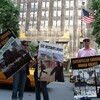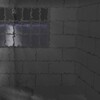
NYC Activists Take Message Against Caterpillar to �Business and Sustainability� Conference
15 June 2005
NYC activists on behalf of Palestinian rights brought their message to the Waldorf-Astoria Hotel this morning, where an executive from Caterpillar was scheduled to appear on a panel social responsibility and sustainability. The spirited rally excited police attention but no arrests. Later, while the CAT exec’s talk was underway, an activist was arrested attempting to make a presentation to the same audience on CAT’s role in Israel’s ongoing campaign to destroy Palestinian homes, while another activist leafleted the conference attendees. Read more about NYC Activists Take Message Against Caterpillar to �Business and Sustainability� Conference








